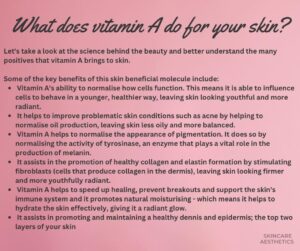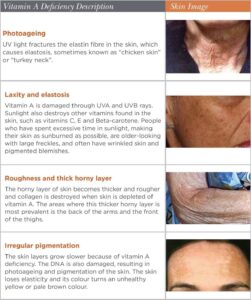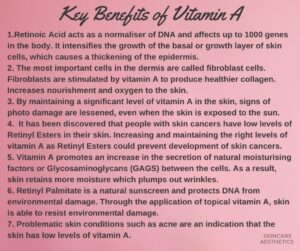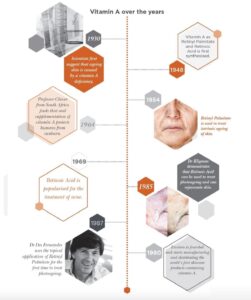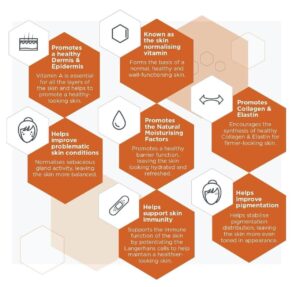Vitamin A, or in other words, retinoid is the gold standard of anti-aging ingredients for overall improvement of the skin. There are various types of retinoids, such as retinol retinyl palmitate, retinaldehyde, with various strengths, some requiring prescription, like Tretinoin, retinoic acid and Retin-A. Retinoids, a broad term for all types, work at a profound cellular level of the skin targeting collagen production, increasing cell turnover, thickening the dermins, improvement of fine lines and wrinkles, skin texture, tone, acne and evening pigmentation.
Dr. Des Fernandes, plastic surgeon and founder of Environ skincare line (one of the first to use vitamin A in skincare), states vitamin A is widely considered one of the most important ingredients in skincare because it is the only molecule that can actually assist in reprogramming cells, resulting in healthier looking and more radiantly skin.
Drug store, or over-the-counter, lines/products vitamin A have very low concentrations of the ingredient. However, Retinol, a more concentrated derivative of vitamin A, is one of the most common types. It can be quite powerful therefore it is recommended starting with a low concentration/dose and with minimal frequency of use to help gradually build up your skin’s tolerance.
Depending on the strength and frequency of use, it can take 4-12 weeks to see a difference. Also the higher concentration you use will increase the side effects such as itchiness, dryness, flakey and redness.
Sun/UV exposure, pollution and free radicals deplete vitamin A naturally found in the skin, therefore it is essential to replenish this deficiency. It is ever more important to use a suncreen as the sun reduces the effectiveness of the vitamin A applied topically.
It is for this reason why Dr. Des Fernandes created the Skin EssentiA Step Up System (steps 1-5). The moisturizer contains a variety of types of vitamin A and with each step the concentration of vitamin A increases the higher you go in the step system to allow the skin to adapt, lessening the risk of vitamin A side effects.
